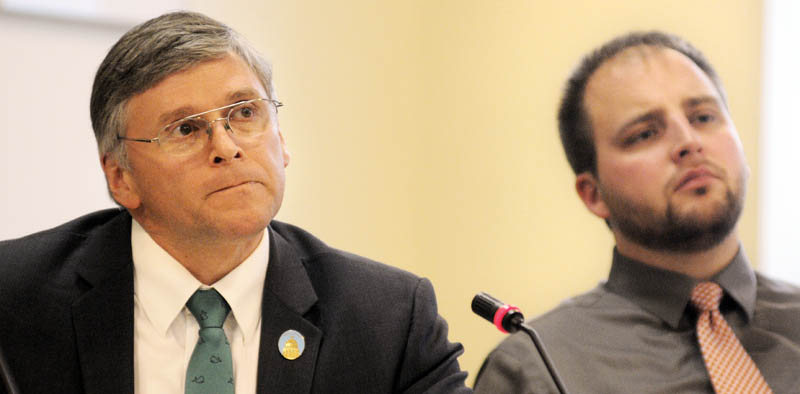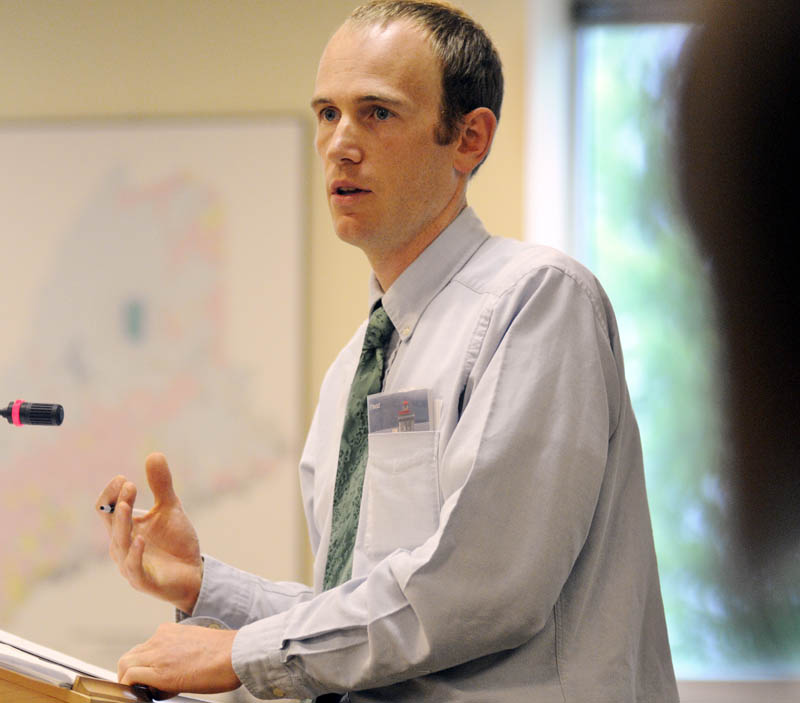AUGUSTA — Teachers and administrators took issue on Tuesday with the weight given to student assessments in proposed regulations for teacher and principal evaluations.
Most people testifying before a legislative panel said the minimum 25 percent that the Department of Education says student growth measures must count toward educator effectiveness ratings is too high.
Several teachers and Maine Education Association representatives said student growth measures should count no more than 10 percent, while the Maine School Boards Association and Maine School Superintendents Association recommended a floor of 15 percent, with the ceiling to be determined locally.
Much remains to be determined in both the state framework for educator evaluations and the systems that local districts must develop in compliance with the framework to implement in 2015-16.
The rules do not specify which students’ growth and which subjects a teacher will be evaluated on, leading the MEA to express concerns that teachers could be held accountable for student assessments in areas where they have little influence. The department’s proposal says a working group would have to be set up to resolve those issues, and the department also must determine protocols for training evaluators.
Once all regulations are in place, school districts must decide how to measure students’ growth, which can include but may not be limited to standardized test scores. They may have to develop their own assessments for nontested subjects such as art, foreign languages and physical education.
The evaluation results may be used to help teachers improve, distribute performance incentives or determine which teachers to let go in a layoff.
With all the work ahead of the state and school districts, some testifying before the Education and Cultural Affairs Committee on Tuesday said they’d like the timeline to be extended, which would require the Legislature to amend the educator effectiveness law passed last year.
Others said the Legislature should not delay in adopting the regulations. Anson-based Regional School Unit 74 is learning by failing, Superintendent Ken Coville said, and other districts will have the chance to do that in the development and pilot phases in the next two years.
“I have lived through this process and believe in it,” he told the committee. “It’s not easy, sometimes a little messy, but it is essential to the improvement of our schools.”
Coville said the framework should not be too specific because developing an evaluation system locally and collaboratively has been key to getting cooperation from all parties in the district, including teachers.
RSU 74 began developing evaluation and performance pay systems two years ago as part of the Maine Schools for Excellence, a project involving 11 school districts and funded by more than $41 million from the federal Teacher Incentive Fund.
RSU 74’s share of the money is paying for expenses such as performance rewards and evaluator training.
“It would not have been possible for us to provide that training within our local budget without some supplemental funding,” Coville said.
For the performance pay system, the district includes graduation rate, dropout rate and attendance as student growth measures, in addition to standardized test results. They’re still choosing other assessments, such as yearly student self-portraits for evaluating art teachers.
Coville said the weight of student growth measures in effectiveness ratings will be decided this summer to align with regulations once they’re approved.
While several teachers said 25 percent is too much weight to give student growth, Messalonskee High School teacher Mary Paine said she’d be OK with 100 percent if there were a valid way to measure student learning because it’s the only thing that counts for teachers.
“There are too many gaps, but the biggest one for me is that there are no decent measures of student growth out there,” Paine said.
Other teachers also questioned the capacity of commonly available assessments to measure skills that matter, or to reflect teacher quality rather than student work.
Doug Hodum, a science teacher at Mount Blue High School in Farmington, said the thing he most likes to hear from students is that he made them think.
“I share this with you … to shine a light on another component of education that goes on in classrooms every day in this state, where teachers find a way to foster lifelong learners and foster in students the ability to think and reason for themselves, not to take standardized tests,” he said. “I would like you to keep in mind all the intangible things that go into teaching and how hard they are to measure.”
The Education Committee’s work session on the regulations is scheduled for 1 p.m. Wednesday.
Susan McMillan — 621-5645
smcmillan@mainetoday.com
Send questions/comments to the editors.




Success. Please wait for the page to reload. If the page does not reload within 5 seconds, please refresh the page.
Enter your email and password to access comments.
Hi, to comment on stories you must . This profile is in addition to your subscription and website login.
Already have a commenting profile? .
Invalid username/password.
Please check your email to confirm and complete your registration.
Only subscribers are eligible to post comments. Please subscribe or login first for digital access. Here’s why.
Use the form below to reset your password. When you've submitted your account email, we will send an email with a reset code.